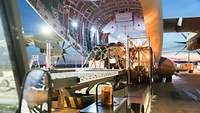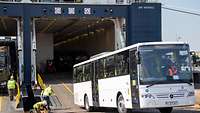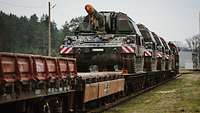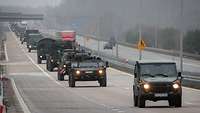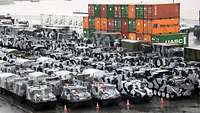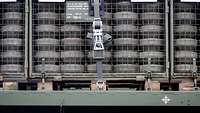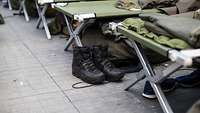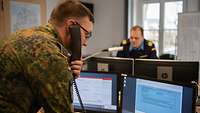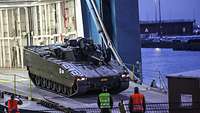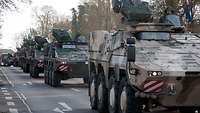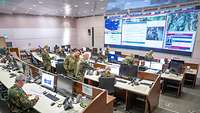Initial deployment: from provision to effectiveness
Due to the new threat level faced on NATONorth Atlantic Treaty Organization’s eastern flank and the growing number of trouble spots emerging in a globalised world, it is essential to be able to deploy troops efficiently at all times. Rapid strategic deployability is therefore a key element of national and collective defence. National initial deployment precedes deployment.
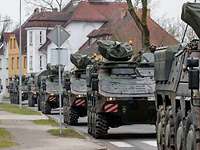
Command and control of initial deployment
Military forces can only be deployed effectively if they are ready for a conflict in good time, fully equipped and combat capable. Rapid strategic deployment is therefore a key component of NATONorth Atlantic Treaty Organization defence planning. Each member of the Alliance is responsible for the initial deployment of its national troops. The Bundeswehr Joint Force Command (BwJFCBundeswehr Joint Force Command) commands initial deployment for the Bundeswehr.
The Bundeswehr’s exercises and operations abroad always require strategic deployment to the respective mission area. The initial deployment of military forces serves as a link between the provision and the deployment of military capabilities. It both precedes and is a prerequisite for strategic deployment to a mission area. This is because during initial deployment national troops are moved to the assembly and starting points for strategic deployment: the so-called points of origin.
These locations can be railway stations, seaports, inland ports, airports or – when moving by road – training areas and other military sites. This is where transport to the mission area begins: by air, by sea, by rail or by road.
It is important to coordinate transportation so that the military personnel reaches the target area at the same time as its equipment and weapon systems and is then able to continue seamlessly to the operations area. Only then can the troops fulfil their reassurance or combat mission effectively and without delay.
Collective defence means parallel deployments
It is not only a country’s own forces that need to be coordinated and deployed to the mission area in the event of a crisis, but also the troops and materiel of allied nations. Germany is integrated in a system of collective defence. This means that Germany always acts together with its NATONorth Atlantic Treaty Organization partners and the European Union. Its armed forces are therefore never on operations alone. When Bundeswehr soldiers are on the move, so too are troops from other nations.
This means that: although transporting and supplying own forces is a national task carried out under national responsibility, it still demands careful planning and complex coordination at the multinational level, due to the large number of simultaneous deployments by different nations.
In an Article 5 contingency, Germany is needed as a hub and support network. In this situation, up to 800,000 military personnel from NATONorth Atlantic Treaty Organization armed forces would need to be transported through Germany to NATONorth Atlantic Treaty Organization’s external borders within 180 days and as quickly as possible, together with their weapon systems and materiel. They would also need support during their stay in Germany – a task that is reflected in the Operational Plan for Germany in the context of Germany’s overall defence.
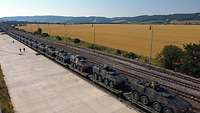
Rail as means of transport: rail is the first choice for long journeys transporting heavy weapon systems by land. The Bundeswehr Homeland Defence Command selects which means of transport is used (pictured).
Bundeswehr/Schneider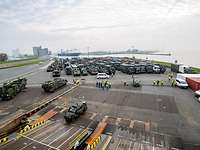
Ready for loading: the Bundeswehr and armed forces of allied nations also use civilian vehicle ferries for strategic deployment to their mission or exercise areas in the Baltic Sea region (pictured).
Bundeswehr/Susanne HähnelPrioritisation according to NATONorth Atlantic Treaty Organization defence planning
Germany serves as a hub for allied forces, especially in deployments to, in and across Europe, for instance to NATONorth Atlantic Treaty Organization’s eastern flank. In this respect, the Bundeswehr Joint Force Command is tasked with the command and control of initial deployment.
It is not only responsible for German troop movements at home and subsequent strategic deployment to the mission area. It also has the task of maintaining a situation picture of the troop movements of all nations deployed on German territory and of coordinating these movements so as to prevent overlapping transport routes and congestion of transport networks.
At the same time, the BwJFCBundeswehr Joint Force Command must ensure that the military capabilities required for a particular operation are available in the mission area in good time. If several nations wish to use one route at the same time, prioritization is determined based on military requirements. These decisions are based on NATONorth Atlantic Treaty Organization defence planning.
Support for German and allied forces
The BwJFCBundeswehr Joint Force Command also coordinates support services for troops on the move and in transit. It does this not only for the Bundeswehr but also as part of host nation support for the armed forces of other nations. These support services include overnight accommodation, meals and medical care as necessary, as well as refuelling, maintenance and repair facilities, transport planning, transport escorts, and protection and security measures.
Initial deployment: always people and materiel
Initial deployment always comprises people and materiel. The mere transportation of weapons and ammunition does not count as initial deployment. However, this does not mean that troops, weapon systems, ammunition and supplies are transported on the same route and at the same time.
While soldiers are often deployed to a mission area by aeroplane, battle tanks, armoured infantry fighting vehicles, command and transport vehicles, other equipment and materiel storage containers are usually transported by ship or by rail. This is because road movements across long distances place huge demands on personnel and equipment.
Initial deployment ends upon arrival in the specified area. Reception in the mission area (Reception), bringing together personnel and materiel (Staging), onward movement to the operations area (Onward Movement) and, if necessary, integrating military forces in a multinational NATONorth Atlantic Treaty Organization formation (Integration) is abbreviated as RSOMReception, Staging, Onward Movement+I. This does not count as part of initial deployment.
Questions and answers
What is initial deployment, what is a command tasked with initial deployment, and what is the role of the regional territorial commands? You can find answers to these and other questions here:
Initial deployment means moving military forces to a railway station, port, airport or assembly point, from which they will then be strategically deployed to a mission area or an exercise area abroad. An appropriately planned and timely initial deployment is crucial for national and collective defence as well as for deterrence and reassurance measures. Because forces can only accomplish their mission if they are completely ready for combat and in the mission area in good time.
Although initial deployment is coordinated with other nations, it remains a national task. This means each country is responsible for deploying and supplying its own troops. However, support from transit nations may be necessary, especially for deployments across several countries. The Bundeswehr Joint Force Command coordinates and commands initial deployment for the Bundeswehr.
No, initial deployment always refers to military forces as a whole, that is to say troops, weapon systems, ammunition, fuels and lubricants, supplies, and so on.
Support services for Bundeswehr units moving through Germany include overnight accommodation, meals, refuelling, maintenance facilities for inoperative equipment, medical care as necessary, protective security, transport escorts and transport planning. They are usually provided by the Bundeswehr itself. However, civilian partners may also be called on for support if necessary.
The Bundeswehr provides similar services to support the armed forces of allied nations during their transit through Germany within the scope of host nation support. However, requests for host nation support services may be declined if there are no capacities available. Bundeswehr convoys, on the other hand, are always supported. Host nation support is also subject to charges for the requesting nations.
The Bundeswehr is responsible for ensuring that military personnel and weapon systems are operationally ready and deployable from their home station to their points of origin within the specified alerting times. In addition, each formation reports any need for additional support to the Bundeswehr Joint Force Command. This may be necessary, for instance, if a formation does not have sufficient transport capabilities with which to transport its entire materiel.
The Bundeswehr Homeland Defence Command commands initial deployment and subsequent strategic deployment to the mission area from the point of origin, namely from a Port of Embarkation (POE, port), an Aerial Port of Embarkation (APOE, airport) or a Rail Port of Embarkation (RPOE, railway station), to the arrival location, i.e. to a Port of Debarkation (POD), an Aerial Port of Debarkation (APOD) or a Rail Port of Debarkation (RPOD).
In the case of road movement through a transit nation, for instance from Germany to Lithuania through Poland, the Homeland Defence Command would request Polish host nation support for the German forces. In the mission area, the Bundeswehr Joint Forces Operations Command then takes over operational command.
The Bundeswehr’s regional territorial commands act as an interface between the Bundeswehr and the authorities, the organisations with security tasks, as well as other civilian authorities in the respective federal states. To plan initial deployment, they determine in advance according to the Bundeswehr Homeland Defence Command’s guidelines where specific support services can be provided, for instance which motorway rest area is suitable for a technical stop. They compare the support required with the existing capacities and then submit proposals for implementation.
Especially if there are last-minute changes, such as additional demand for overnight accommodation or a new routing for an ammunition transport, action is taken by the district and region liaison detachments of the regional territorial commands. They have close working relationships within the territorial network, for example with local community administrations.
In addition, the regional territorial commands are in command of the homeland security forces, which perform protection and security tasks for critical infrastructure and along the march routes of German and foreign forces during initial deployment.
The Bundeswehr Joint Force Command is in charge of initial deployment. It coordinates and commands initial deployment of the Bundeswehr’s military units in Germany. It is also responsible for planning and coordinating support services for the armed forces of allied nations during their transit through Germany.
Due to the large number of processes and deployments running in parallel, the main task of the Joint Forces Operational Command is to coordinate and prioritise requests for routes and support, for example if UKUnited Kingdom and USUnited States armed forces both request overnight accommodation in a specific Bundeswehr barracks at the same time, or if ammunition transports that are only permitted on specific roads need to be postponed. In the event of a conflict, operational necessity is the determining factor.
This means NATONorth Atlantic Treaty Organization decides which military capability is needed first, i.e. which military forces of the Bundeswehr or an allied nation will be transported to the mission area first.
In addition, the operations centre of the DEU JFCJoint Force Command maintains a continuous situation picture so that it can swiftly respond to unforeseen events, such as road closures, and replan at short notice.
It does not make a difference to planning or procedures whether initial deployment is part of an exercise abroad or whether it leads to an operation or standby commitments. However, in order that the Bundeswehr can contribute to multinational exercises abroad and fulfil German commitments to NATONorth Atlantic Treaty Organization and the European Union, it is important that initial deployment is carried out rapidly and with efficient command and control.
Effective national and collective defence means that it must be possible to deploy the forces of the Bundeswehr and of international partners in the right place and at the right time in the event of a crisis. This is the aim and the result of initial deployment.


